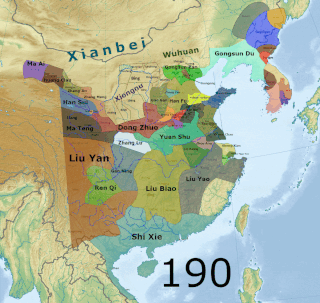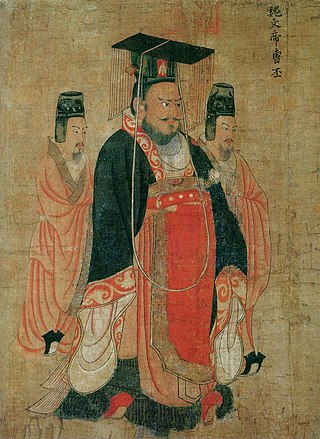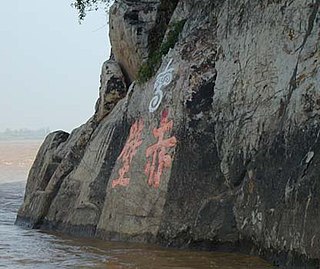Related Research Articles

The Three Kingdoms of Cao Wei, Shu Han, and Eastern Wu dominated China from 220 to 280 AD following the end of the Han dynasty. This period was preceded by the Eastern Han dynasty and followed by the Western Jin dynasty. Academically, the periodisation begins with the establishment of Cao Wei in 220 and ends with the conquest of Wu by Jin in 280. The period immediately preceding the Three Kingdoms, from 184 to 220, was marked by chaotic infighting among warlords across China as Han authority collapsed. The period from 220 to 263 was marked by a comparatively stable arrangement between Cao Wei, Shu Han, and Eastern Wu. This stability broke down with the conquest of Shu by Wei in 263, followed by the usurpation of Cao Wei by Jin in 266 and ultimately the conquest of Wu by Jin in 280.

Sun Quan, courtesy name Zhongmou (仲謀), posthumously known as Emperor Da of Wu, was the founder of Eastern Wu, one of the Three Kingdoms of China. He inherited control of the warlord regime established by his elder brother, Sun Ce, in 200. He declared formal independence and ruled from November 222 to May 229 as the King of Wu and from May 229 to May 252 as the Emperor of Wu. Unlike his rivals Cao Cao and Liu Bei, Sun Quan was much younger and governed his state mostly separate of politics and ideology. He is sometimes portrayed as neutral considering he adopted a flexible foreign policy between his two rivals with the goal of pursuing the greatest interests for the country.

Cao Pi, courtesy name Zihuan, was the first emperor of the state of Cao Wei in the Three Kingdoms period of China. He was the second son of Cao Cao, a warlord who lived in the late Eastern Han dynasty, but the eldest son among all the children born to Cao Cao by his concubine, Lady Bian. According to some historical records, he was often in the presence of court officials in order to gain their support. He was mostly in charge of defence at the start of his career. After the defeat of Cao Cao's rival Yuan Shao at the Battle of Guandu, he took Yuan Xi's wife, Lady Zhen, as a concubine, but in 221 Lady Zhen died and Guo Nüwang became empress.

Wu, known in historiography as Eastern Wu or Sun Wu, was a dynastic state of China and one of the three major states that competed for supremacy over China in the Three Kingdoms period. It previously existed from 220 to 222 as a vassal kingdom nominally under Cao Wei, its rival state, but declared complete independence in November 222. It was elevated to an empire in May 229 after its founding ruler, Sun Quan, declared himself emperor.
Xu Sheng, courtesy name Wenxiang, was a military general serving under the warlord Sun Quan in the late Eastern Han dynasty and early Three Kingdoms period of China.

The Battle of Red Cliffs, also known as the Battle of Chibi, was a decisive naval battle in China that took place during the winter of AD 208–209. It was fought on the Yangtze River between the forces of warlords controlling different parts of the country during the end of the Han dynasty. The allied forces of Sun Quan, Liu Bei, and Liu Qi based south of the Yangtze defeated the numerically superior forces of the northern warlord Cao Cao. By doing so, Liu Bei and Sun Quan prevented Cao Cao from conquering any lands south of the Yangtze, frustrating Cao Cao's efforts to reunify the territories formerly held by the Eastern Han dynasty.

The military history of the Three Kingdoms period encompasses roughly a century's worth of prolonged warfare and disorder in Chinese history. After the assassination of General-in-chief He Jin in September 189, the administrative structures of the Han government became increasingly irrelevant. By the time of death of Cao Cao, the most successful warlord of North China, in 220, the Han empire was divided between the three rival states of Cao Wei, Shu Han and Eastern Wu. Due to the ensuing turmoil, the competing powers of the Three Kingdoms era found no shortage of willing recruits for their armies, although press-ganging as well as forcible enlistment of prisoners from defeated armies still occurred. Following four centuries of rule under the Han dynasty, the Three Kingdoms brought about a new era of conflict in China that shifted institutions in favor of a more permanent and selective system of military recruitment. This ultimately included the creation of a hereditary military class as well as increasing reliance on non-Chinese cavalry forces and the end of universal conscription.
Xiahou Shang, courtesy name Boren, was a Chinese military general and politician of the state of Cao Wei during the Three Kingdoms period of China. He was a distant younger relative of Xiahou Yuan and a close friend of Cao Pi, the first emperor of the Cao Wei state.
Wen Ping, courtesy name Zhongye, was a military general who lived during the late Eastern Han dynasty and Three Kingdoms period of China. During his tenure as a general under the warlord Cao Cao, he was credited with defeating the enemy general Guan Yu and defending Cao Cao's interests in Jiangxia Commandery from the eastern warlord Sun Quan.
Sun Shao (188–241), born Yu Shao, courtesy name Gongli, was a military general of the state of Eastern Wu during the Three Kingdoms period of China. Sun Ce, a warlord who lived in the late Eastern Han dynasty, granted the family name "Sun" to Sun Shao but never adopted him as a son. Sun Shao's uncle was Sun He (孫河) né Yu He (俞河), who had been brought into the Sun clan by Sun Jian. Sun Shao was described as a handsome man and was eight chi tall.
Zhu Zhi (156–224), courtesy name Junli, was a Chinese military general and politician serving under the warlord Sun Quan during the late Eastern Han dynasty and early Three Kingdoms period of China. He was from Guzhang County (故鄣縣), Danyang Commandery (丹楊郡), which is present-day Anji County, Zhejiang.

Zhu Ran, born Shi Ran, courtesy name Yifeng, was a Chinese military general of the state of Eastern Wu during the Three Kingdoms period of China. Despite being a childhood friend of Wu's founding emperor, Sun Quan, he was never given an important position or assignment before Lü Meng's invasion of southern Jing Province in 219, wherein he assisted in capturing the enemy commander, Guan Yu. Following the Battle of Xiaoting, Wu's rival state, Cao Wei, launched a three-pronged strike on Wu's northwestern, middle, and eastern borders. Zhu Ran was sent to the northwestern border, where he defended the city of Jiangling with only 5,000 troops against an enemy force about ten times greater. He rose to fame and became feared throughout Wei. He then participated in a series of military operations against Wei, during which he defeated several enemy units, but the overall objectives were never met. Before his death, Zhu Ran was granted authority to oversee matters within the army.
Pan Zhang, courtesy name Wengui, was a military general serving under the warlord Sun Quan during the late Eastern Han dynasty of China. He continued serving in the state of Eastern Wu during the Three Kingdoms period until his death. Pan Zhang was praised by Chen Shou as one of the "twelve tiger minister of Jiangdong" (江東十二虎臣).
The Battle of Xiakou was fought between the warlords Sun Quan and Liu Biao in 203 in the late Eastern Han dynasty. Sun Quan's forces attempted to conquer Jiangxia Commandery, which was defended by Liu Biao's general, Huang Zu. The battle was inconclusive as Sun Quan's forces were unable to capture Jiangxia even when Huang Zu retreated. The battle is not to be confused with the Battle of Jiangxia that took place five years later, which concluded with victory for Sun Quan over Huang Zu.
The Battle of Dongkou was a naval battle fought between October 222 and January 223 between forces of the state of Cao Wei and the Kingdom of Wu during the Three Kingdoms period of China. The battle concluded in a Wu victory.

During the Three Kingdoms period of Chinese history, Cao Pi, the first emperor of the state of Cao Wei, invaded the rival state of Eastern Wu thrice during his reign between 222 and 225. The casus belli for the attack was the Wu leader Sun Quan's refusal to send his son Sun Deng as a hostage to the Wei court, under which Wu was a nominal vassal at the time. The invasions were separated into two parts. The first attack occurred in the years 222–224 before Cao Pi ordered total retreat. The second and last part was fought in 225.
The Battle of Jiangling was fought between the forces of the Cao Wei and Eastern Wu dynasties in the early Three Kingdoms period of China. The battle, which took place around present-day Jiangling County, Hubei, was an integral part of the Wei emperor Cao Pi's three-pronged campaign against the Wu leader Sun Quan. It spanned a period of about six months from October 222 to April 223. Of the three fronts, the most critical Wei attacks were concentrated against the Wu fortress at Jiangling.
The Battle of Ruxu, also known as the Battle of Ruxukou, took place in 222-223 between the forces of Cao Wei and Eastern Wu during the Three Kingdoms period. The battle was the third battle taking place between the Cao and Sun clan at Ruxu, but this particular conflict was the only of the three to take place actually during the Three Kingdoms period, as the other two took place in 213 and 217.
The Battle of Qichun took place in June 223 between the state of Cao Wei and the kingdom of Wu during the Three Kingdoms period of Chinese history.
Yangzhou, Yangchow or Yang Province was one of the Nine Provinces of ancient China mentioned in historical texts such as the Tribute of Yu, Erya and Rites of Zhou.
References
- ↑ De Crespigny, Rafe. "Online Publications" (PDF). Asian Studies. Archived from the original (PDF) on 8 June 2011. Retrieved 10 April 2012.
His headquarters were established in the former capital of the commandery, and it was claimed that the army under his command was more than a hundred thousand.
- ↑ De Crespigny, Rafe. "Online Publications" (PDF). Asian Studies. Archived from the original (PDF) on 8 June 2011. Retrieved 10 April 2012.
Looking at the unassailable barrier, Cao Pi sighed, "Alas. It is truly the will of Heaven which divides the south from the north." And he gave the order to withdraw.
- ↑ De Crespigny, Rafe. "Online Publications" (PDF). Asian Studies. Archived from the original (PDF) on 8 June 2011. Retrieved 10 April 2012.
His headquarters were established in the former capital of the commandery, and it was claimed that the army under his command was more than a hundred thousand.
- ↑ De Crespigny, Rafe. "Online Publications" (PDF). Asian Studies. Archived from the original (PDF) on 8 June 2011. Retrieved 10 April 2012.
The Wei forces, however, had evidently gained some surprise, for the defences in that area were weak. A local general, Xu Sheng, organised the preparation of dummy defence walls and turrets along the southern bank of the Yangzi from Jianye downstream to Jiangcheng, and the Wu were also able to concentrate a reasonable fleet to oppose Cao Pi.
- ↑ De Crespigny, Rafe. "Online Publications" (PDF). Asian Studies. Archived from the original (PDF) on 8 June 2011. Retrieved 10 April 2012.
This time Sun Quan's forces were ready for the attack, but far more serious from Cao Pi's point of view was the weather. The winter was harsh and early, the Yangzi was partially frozen, and the ships of Cao Pi were blocked by ridges of ice along the shore, with additional danger from small bergs breaking off and floating with the current
- ↑ De Crespigny, Rafe. "Online Publications" (PDF). Asian Studies. Archived from the original (PDF) on 8 June 2011. Retrieved 10 April 2012.
"Alas. It is truly the will of Heaven which divides the south from the north." And he gave the order to withdraw.